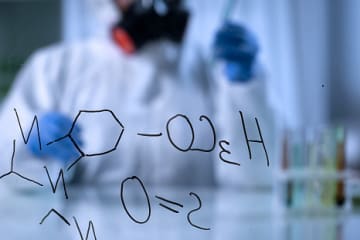What Can You Do With a Forensic Science Degree?

There are many exciting careers in the forensic science field, such as the roles of forensic science technician, forensic anthropologist and forensic chemist. If you have a passion for science and an interest in how it can be applied to law enforcement, you might consider pursuing one of many forensic career paths.
There are many possible forensic science career paths, all of which have their own individual career requirements. Here, you can identify the careers that interest you most and then explore the degree requirements for those careers.
In This Article:
- Can You Major in Forensic Science
- Forensic Science Degrees
- Forensic Science Occupations and Specialty Areas
Can You Major in Forensic Science?
You can indeed major in forensic science at many universities if you would like to pursue a career in the forensic science field. A forensic science degree will typically cover topics such as forensic photography and reconstruction, crime scene processing, evidence collection and physical evidence analysis. Students may also take classes in chemistry, molecular biology, genetics and physics.
Forensic Science Degrees
An aspiring forensic science technician may choose from a few different majors. It’s possible to pursue this career with an academic background in biology or physical science, for example.1 However, the most relevant degree is a forensic science degree.
Grand Canyon University offers a Bachelor of Science in Forensic Science program, which is designed for students who intend on pursuing a career such as a forensic science technician. This degree can also provide a foundation for pursuing graduate-level education in the field, which may be necessary for more advanced career options.2
Forensic Science Occupations and Specialty Areas
An aspiring forensic science professional may be interested in any number of subspecialties and work settings, ranging from forensic chemistry to forensic toxicology and beyond.
Forensic Science Technician
You might pursue a forensic science degree with the goal of becoming a forensic science technician. There are many different specialties for technicians to pursue. These include serology, DNA analysis, chemistry, trace analysis, firearms and toolmark, questioned documents and toxicology.
Forensic science technicians support criminal investigations by gathering and studying evidence. At crime scenes, technicians take photographs, make sketches, record observations and collect evidence.
Forensic science technicians are also responsible for ensuring that evidence is preserved and the protocols for proper chain of custody are followed. However, only some technicians spend time at the crime scene itself. Other technicians work in the lab, where they perform biological, chemical and microscopic analyses on the evidence.
To be successful in forensic science, you will need strong attention to detail. Even the most minute of details could prove instrumental in constructing a case against a perpetrator. It’s also helpful to have good communication skills, analytical reasoning and problem-solving skills.1
According to the U.S. Bureau of Labor Statistics (BLS), the job growth rate for forensic science technicians is expected to be 14% from 2023 to 2033, much faster than average.3
Forensic Chemistry
Forensic chemistry involves the identification of unknown substances. Professionals can use laboratory tests to identify unknown drugs found at crime scenes and collected from individuals.
Forensic chemistry involves a wide range of specific tests and equipment, including gas chromatography, mass spectrometry and high-pressure liquid chromatography analyses. After performing tests, professionals document their findings in reports and may be called upon to testify in court.
Forensic Anthropology
Forensic anthropology is the study of human remains. The goal is to determine how the individual died, such as whether it was a homicide or suicide or whether the person died of natural or accidental causes. Forensic anthropologists also seek to determine the time since death and attempt to identify the remains.
This specialty within forensic science involves the following:
- Properly handling human remains
- Cleaning skeletal remains
- Evaluating the remains for indicators of trauma
- Running tests to compile biological information about the remains
- Documenting findings
- Collaborating with investigators
- Giving testimony in criminal court cases
Some of the work of this specialty area may be performed in the field, such as the collection and transportation of human remains. Most tests, however, are performed in laboratory settings.
Digital Forensic Analysis
Some crimes involve digital aspects, while other crimes are committed entirely via digital means. Digital forensic analysis involves the collection of digital evidence and investigation of digital crimes (and of crimes that may only partially involve the digital space).
For instance, digital forensic analysis can be helpful when investigating a malware attack on a healthcare facility or school. It can also be used when homicide detectives need to determine if there could be any evidence on a murder suspect’s phone — such as GPS location data that could prove the individual was in the vicinity of the victim.
Firearms
Firearms is a branch of forensic science that deals with firearms and their projectiles. A firearms analyst may seek to determine, for example, the marks that a gun makes on a bullet when it is fired. This can help scientists connect a specific gun to a particular crime.
Firearms can also evaluate the angle of trajectory for a bullet, which may help reveal details about a crime such as the position of the shooter. Firearms evidence may help answer questions about a crime, such as, Is it possible the gun was accidentally fired? and How far away was the shooter when the gun was fired?
Forensic Toxicology
Drugs and other chemicals can cause a number of effects on the body and mind and may sometimes play a role in various crimes. Forensic toxicology involves analyzing substances found on or in suspects and victims. For example, a forensic toxicology examination may identify a date rape drug in a victim or the presence of alcohol in a suspect charged with vehicular manslaughter.
Science Writing
Not everyone with a forensic science background decides to pursue forensic career paths within law enforcement. Science writing is a specialized type of journalism that involves researching, writing and editing news and feature articles pertaining to scientific fields. Science writing may be geared toward a scientific audience or toward a layperson audience.
Explore Forensic Science Degrees at GCU
The College of Natural Sciences at Grand Canyon University offers numerous science degrees for students who have a passion for this field. The Bachelor of Science in Forensic Science degree program may interest you if you aspire to pursue forensic career paths. Fill out the form on this page to speak with a university counselor about your future at our private Christian school.
1 U.S. Bureau of Labor Statistics. (2024, Aug. 29). How To Become a Forensic Science Technician. Occupational Outlook Handbook. Retrieved Feb. 21, 2025.
2 LevelUp Degree. (2024, May 8). Is a Master's in Forensic Science Worth It? Retrieved March 17, 2025.
3 COVID-19 has adversely affected the global economy and data from 2020 to 2023 may be atypical compared to prior years. Accordingly, data shown is effective Sept. 2024, which can be found here: U.S. Bureau of Labor Statistics, Occupational Outlook Handbook, Forensic Science Technicians, retrieved on Feb. 21, 2025.
Approved and verified accurate by the forensic science programs director of the College of Natural Sciences on March 17, 2025.
The views and opinions expressed in this article are those of the author’s and do not necessarily reflect the official policy or position of Grand Canyon University. Any sources cited were accurate as of the publish date.


